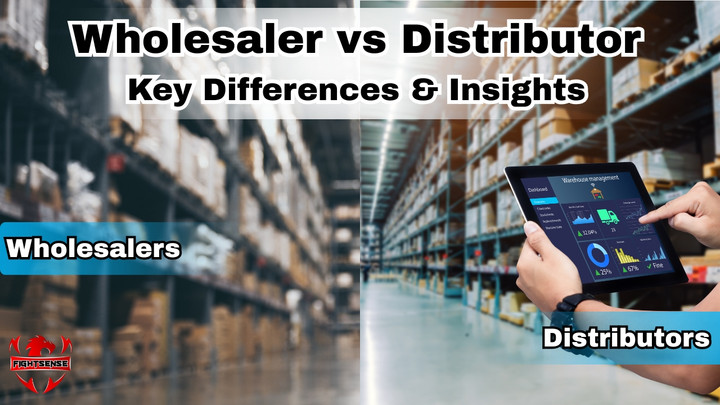Wholesaler vs Distributor: Key Differences & Insights
2nd May 2025
It's important for your business to pick the correct supplier partner. Choosing the correct wholesaler vs distributor might effect expenses and how things work.
Fightsense is a trusted U.S. distributor that sells certified self-defense and gym items. They ship quickly, have actual wholesale prices, and give reliable assistance for merchants.
Main Benefits:
- You can buy self-defense and gym gear directly from us at low costs.
- Unlike distributors, they focus on getting products to customers quickly.
- A wide choice of high-quality, reliable items.
- Simple to keep track of stock and simple to replenish.
- Fast, cheap, and easy bulk supplies.
Wholesaler vs Distributor: What’s the Difference?
A comparison of distributor vs wholesalershows two important functions in the supply chain. Both take items from producers to businesses, but they do so in different ways.
Wholesalers buy a wholesale goods from producers and sell lesser amounts to stores. They focus on transactions and provide profits growth.
Wholesale distributors usually work under exclusive contracts, which means they are responsible for more than simply sales. They typically handle marketing, logistics, and customer service to promote certain brands.
Fightsense Products Available for Wholesale
- Wide Selection: Stun guns, lipstick stun guns, pens stun guns, electroshock weapons, pepper sprays, keychains, and personal alarms for self-defense in many situations.
- Stylish and portable: Sleek designs that are easy to take with you every day.
- Trusted Quality: Made to fulfill high safety standards so it will work reliably.
- Business-friendly: Low minimum order quantities, quick replenishment, and great wholesale prices.
Wholesaler vs Distributor: Key Differences
1. Scope of Work
Wholesalers buy and sell in bulk and handle the logistics of wholesale offers without offering supplementary services. Their major purpose is to transfer things quickly and cheaply.
Distributors operate as middlemen between producers and businesses. They offer a larger range of services, such as marketing, customer assistance, and branding.
2. Pricing and Terms
Wholesalers sell in bulk at lower prices that is smart choice for stores to shop bulk and don't offer after-sales service, which makes things easier. They're great for businesses who want cheap goods.
Distributors may charge more because they offer extra services like logistics, customer support, and inventory management. This greater cost is typically justified.
3. Exclusivity
Distributors can have exclusive rights to some products, which helps them sell, save big and advertise certain brands well.
Wholesalers provide products from many different manufacturers, which gives firms more choices but less exclusivity.
4. Volume and Quantity
Wholesalers or wholesale suppliers sell things in huge quantities at low prices, which is great for firms that want to resell them.
Distributors can send both small and large amounts, which gives businesses the ability to grow and change without having to pay a lot of money up front.
5. Customer Support
Wholesalers just care about sales and inventory, thus they don't offer much help to customers or after-sales assistance.
Distributors like Fightsense products help firms expand by giving them ongoing services, such as technical support, marketing, and product training.
6. Marketing and Promotional Activities
Wholesalers sell items as they are with little marketing, which helps keep costs down.
Wholesale retail help with marketing, promotions, and brand management to make products more visible and sell more.
Conclusion
Choosing between wholesaler vs distributor relies on how you want to expand. If you want to make the most money, keep track of your inventory, and grow your business quickly, a wholesaler like Fightsense is your best bet.
Fightsense gives resellers the tools they need to move quickly and remain ahead with certified self-defense products, competitive bulk pricing, and experienced B2B support.
Disclaimer: The content of this blog is intended primarily for general informative purposes. Before deciding on any business matter, kindly speak with a specialist.
FAQs
- What is the primary difference distributor vs wholesaler?
Distributors provide additional services, including marketing and support, wholesalers concentrate on large purchases. - Do wholesalers offer better prices than distributors?
Indeed, because of bulk buying, wholesalers usually sell at lower prices; distributors charge more for extra services. - Can wholesalers provide exclusive products?
Though distributors may have exclusive rights to specific product lines, wholesalers often carry a large range of items. - Should I work with a wholesaler vs distributor for self-defense products?
It depends on your needs: distributors for exclusive access and additional services, or wholesalers for bulk purchases. - Are wholesale distributors in the USA reliable for international shipping?
Although many U.S.-based wholesalers provide dependable overseas shipping choices, please confirm their capabilities before placing significant orders.

